Photographs: Sergei Karpukhin/Reuters
Twenty one months later, tensions between the two nations has apparently cooled down. A number of high-level interactions between the leaders and diplomats from both India and Pakistan have helped in paving the way for dialogue again.
All eyes will be on External Affairs Minister S M Krishna as he embarks on a mission to Pakistan on Wednesday.
Rediff.com takes a look at how the ice between the two estranged neighbours melted after months of diplomatic and political antagonism.
Prime Minister Manmohan Singh met Pakistan President Asif Ali Zardari in Russia on the sidelines of the Shanghai Co-operation Organisation meeting on June 16, 2009.
This was the first meeting between the two leaders after India cut off all communication with Pakistan after 26/11.
However, the much hyped photo-opportunity, when Dr Singh shook hands with Zardari, turned serious soon.
In the media's presence, Dr Singh told Zardari, 'I am very happy to meet you, but I must tell you quite frankly that I have come with the limited mandate of discussing how Pakistan can deliver on its assurances that its territory would not be used for terrorist attacks on India.'
Dr Singh later clarified, 'I simply forgot that the media was present there. It was not my intention in anyway to hurt Zardarisahib's feelings.'
The Sharm el-Sheikh shocker
Image: Pakistan's Prime Minister Yousaf Raza Gilani with Dr Singh at Sharm el-Sheikh, EgyptPhotographs: Amr Abdallah Dalsh/Reuters
Dr Singh did not anticipate the furore back home over the joint statement issued by the two prime ministers after the meeting.
The joint statement de-linked the action to be taken by Pakistan against the terrorists who plan and carry out terror acts in India to the resumption of the composite dialogue process between the two nations.
This statement, endorsed by Dr Singh and Gilani, diluted the tough stance India had taken against Pakistan-based terror post 26/11.
Indian observers were also aghast at the mention of the burgeoning terrorism in Balochistan; Pakistan has often accused India of encouraging insurgents in the restive region.
The Bharatiya Janata Party claimed that the United Progressive Alliance government had dealt a 'huge blow' to the basic tenets of the country's foreign policy. Dr Singh was forced to defend the joint statement in Parliament.
India thaws, Pak blusters
Image: Foreign Secretary Nirupama Rao with her Pakistani counterpart Salman Bashir in New DelhiPhotographs: B Mathur/Reuters
Pakistan Foreign Secretary Salman Bashir met his Indian counterpart Nirupama Rao in New Delhi on February 25. Both diplomats had served as their nations's respective ambassadors in China.
But the much-hyped meeting turned out to be a damp squib and failed to produce any concrete results. The two countries promised to 'stay in touch', but differed strongly on the 'core issues' that plagued bilateral ties.
While India wanted a commitment from Pakistan about curbing terrorism, Islamabad tried to raise its pet issues of Kashmir and the water dispute.
Bashir made matters worse during the press conference held after the meeting. He defended the release of Lashkar-e-Tayiba founder Mohammad Saeed and claimed that the dossiers provided by India were 'literature rather than evidence'.
He also sulked about India stalling the bilateral dialogue over the issue of terror and added that Pakistan didn't need a lecture on it.
PM, Gilani repair the damage
Image: Dr Singh with Gilani before their meeting at ThimphuPhotographs: Rupak De Chowdhuri/Reuters
There was no controversial joint statement this time. Instead, both leaders asked their foreign ministers and foreign secretaries to set the modalities to find out what ails the bilateral relations.
Dr Singh and Gilani decided that the channels of dialogue between the two countries should be kept open to restore 'trust and confidence' in the bilateral relationship.
In a 'free and frank manner', Dr Singh told Gilani that India was willing to discuss all issues of mutual concern through dialogue, but the issue of terrorism is holding back the progress.
Pakistan's usually belligerent Foreign Minister Shah Mehmood Qureshi admitted that the meeting between the two leaders ended on a positive note and it had 'changed the climate' between the two countries.
Rao and Bashir try again
Image: Bashir with Rao in Islamabad on June 24Photographs: Adrees Latif/Reuters
Meeting for the second time in four months, Nirupama Rao and Salman Bashir described their parleys as 'cordial and constructive'.
Rao, the first senior Indian official to travel to Pakistan after the Mumbai terror attacks, asserted that the orientation of the re-engagement between the two countries was to look at the reasons why there was a trust deficit and how it can be bridged.
Unlike their last meeting, both sides this time were cautious in articulating their positions before the media on various issues raised during the parleys.
Asked whether both countries were getting irritated by each other's core issues, Bashir said, 'I think it is not a question of irritation. We realise that there are complex issues on both sides that we have to address.'
Chidambaram talks tough
Image: Home Minister P Chidambaram with his Pakistani counterpart Rehman Malik in Islamabad, June 25Photographs: Faisal Mahmood/Reuters
Chidambaram had traveled to Islamabad to attend the South Asian Association for Regional Cooperation home ministers' meeting.
Chidambaram took care not to directly blame Pakistan for the acts of terrorism in Indian territory committed by Pakistan-based terror organisations.
At the same time, he did not hesitate to highlight directly or indirectly Pakistan's inaction or unsatisfactory action against anti-India terrorists in general and the Lashkar-e-Tayiba in particular.
'We spoke with each other. We spoke directly to each other and I am confident that something good will emerge out of that meeting. So, let's try to remain positive,' Chidambaram said after his meeting with Malik.
He emphasised that India had no role to play in fomenting terror in Balochistan and sought action against Lashkar terrorist Mohammad Saeed.


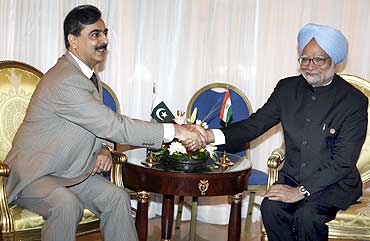
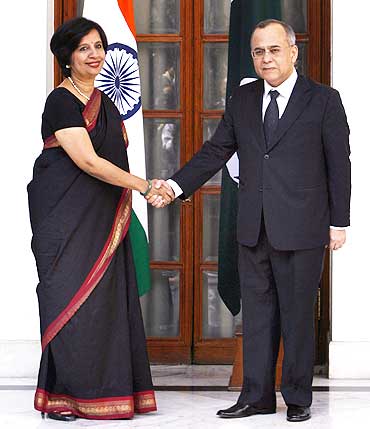
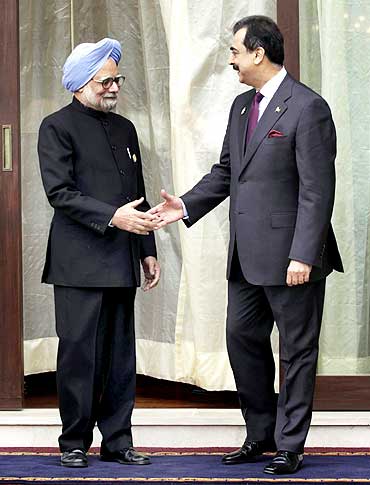
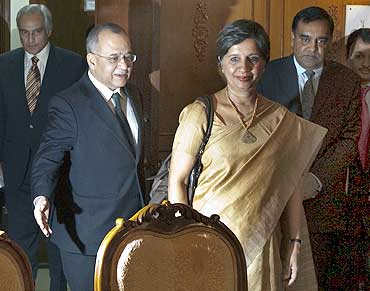
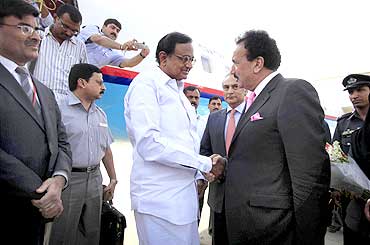
article